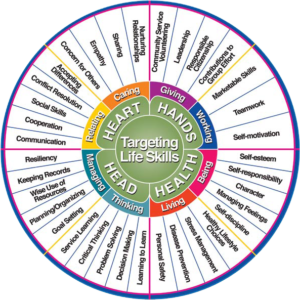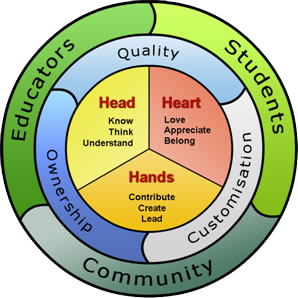
 part of being able to meet the challenges of everyday life. The dramatic changes in global economies over the past five years have been matched with the transformation in technology and these are all impacting on education, the workplace and our home life. To cope with the increasing pace and change of modern life, students need new life skills such as the ability to deal with stress and frustration. Today’s students will have many new jobs over the course of their lives, with associated pressures and the need for flexibility.
part of being able to meet the challenges of everyday life. The dramatic changes in global economies over the past five years have been matched with the transformation in technology and these are all impacting on education, the workplace and our home life. To cope with the increasing pace and change of modern life, students need new life skills such as the ability to deal with stress and frustration. Today’s students will have many new jobs over the course of their lives, with associated pressures and the need for flexibility.World Health Organization (WHO) in 1993 defined life skills as, “the abilities for adaptive and positive behavior that enable individuals to deal effectively with demands and challenges of everyday life.
 The term Life Skill Education, is being widely used nowadays but it is often used interchangeably with livelihood skills. But the two are different. Livelihoods skills as the name suggests, are skills, related to generate income to fulfill one’s household/individual economic goals. These skills basically involve vocational skills, business management skills etc, where as life skills encompasses all the dimensions of human life, be it economical, social or psychological.
The term Life Skill Education, is being widely used nowadays but it is often used interchangeably with livelihood skills. But the two are different. Livelihoods skills as the name suggests, are skills, related to generate income to fulfill one’s household/individual economic goals. These skills basically involve vocational skills, business management skills etc, where as life skills encompasses all the dimensions of human life, be it economical, social or psychological.Therefore, life skills are a large group of psycho-social and interpersonal skills, which can help people, to make informed decisions, communicate effectively and develop coping and self management skills that may help an individual to lead a healthy and productive life.
Benefits for the individual
In everyday life, the development of life skills will help students to:
1. Find new ways of thinking and problem solving
2. Recognize the impact of their actions and teaches them to take responsibility for what they do rather than blame others
3. Build confidence both in spoken skills and for group collaboration and cooperation
4. Analyse options, make decisions and understand why they make certain choices outside the classroom
5. Develop a greater sense of self-awareness and appreciation for others
Benefits for employment
1. While students work hard to get good grades, many still struggle to gain employment. According to research by the CBI (Confederation of British Industry) in 2011 employers were looking not just for academic success but key employability skills including
2. Ability to self-manage, solve problems and understand the business environment
3. Working well as part of a team
4. Time and people management
5. Agility and adaptability to different roles and flexible working environments
6. The potential to lead by influence
Benefits for society
1. The more we develop life skills individually, the more these affect and benefit the world in which we live
2. Recognizing cultural awareness and citizenship makes international cooperation easier
3. Respecting diversity allows creativity and imagination to flourish developing a more tolerant society
4. Negotiation skills, the ability to network and empathies can help to build resolutions rather than resent me
Shipey Foundation Life Skill Development Programmes
1. Leadership Development for School Principals
2. 21ST Century Teaching/Learning skills for teachers
3. 21st Century English Communication skills for Employers/Employees Speaking/Writing/Listening/Reading
4. Classroom Management Programmed for Teachers to educate the 21st Century student
5. Principal and Teachers International Exchange Programmes to UK/USA/Finland


